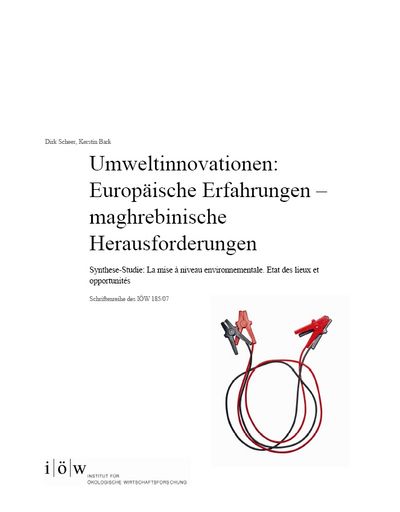Umweltinnovationen: Europäische Erfahrungen – maghrebinische Herausforderungen Synthese-Studie: La mise à niveau environnementale. Etat des lieux et opportunités
The German technical cooperation officially know as «Gesellschaft für technische Zusammenarbeit» (GTZ) currently carries out together with its Maghrebenian partners a project titled «Réseau des entreprises maghrébines pour l’environnement (REME)». In a first step three country-studies analysing the environmental status-quo and challenges in Algeria, Morocco and Tunesia were compiled. In a second step, the present synthesis report sheds light on Maghrebenian environmental challenges against European experiences with special focus on new East European Member States and Germany.
The discourse on corporate environmental protection increasingly puts emphasis on the term innovation. Innovations towards sustainable development have been named environmental innovations with the objective to improve the environmental quality and to cope with persistent environmental problems. European experiences show positive effects between environmental innovations and competitiveness and employment. However, impacts are not that strong to encourage companies independently to follow the path towards ecological modernisation. European experiences reveal that a cooperative, transparent and innovation encouraging policy style is decisive for efficient environmental outcomes. A combination of regulative and « new » environmental policy instruments seems promising. There is a closer look at the following policy instruments: emissions and product charges, « green » public procurement, models of financing, market for environmental consulting and cluster policy as well as public private partnership.
The challenges of environmental policies in the Maghreb show that a suiting environmental legislation is actually in force or under development; however, the status-quo shows considerable implementation deficits. Even though several economic environmental policy instruments partly exist, e.g. taxes, fees and environmental programmes, there impact is modest. The great varieties of financial and technical supporting programmes do not efficiently reach the local industry. Supporting and incentive programmes are perceived and accepted by industry only on a small scale. Given these facts, the recommendations focus on the extension of environmental instruments, infrastructure and monitoring as well as activities and initiatives to support cooperation among decision-makers from politics, business and society.



